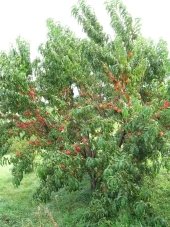I've completed my
PDC and spent some time on a few PC and organic farms, and I've been trying to convince myself that I want to start a food forest in the tropics. I'd love one, I'm sure, but one issue that keeps coming back up for me, that keeps me reading and wondering and excited, is deserts and arid landscapes.
Ever since I read, “
The Man Who Planted Trees,” when I was in 6th grade I've been fascinated by the idea of regenerating wasted landscapes via planting. When I saw Greening The Desert when I was in college, I couldn't believe what I was seeing – it was the magic of that short story transported to the real world.
I can't shake the idea of creating a desert food forest, so I'm going to stop trying and start embracing it.
What I'm looking for is an opportunity to learn, via hands on application and an experienced teacher, how to do what I want to do. I'm really not looking for more classroom time at this point. I want to get my hands dirty.
I'd ideally like to work with or for someone who is setting up a fruit-based food forest in a Mediterranean or warmer arid environment capable of growing a large variety of fruit trees. The area of the world isn't that important. I can travel. I'm currently in Asia, so I'm half way to the deserts of the Middle East or the Americas, and will eventually have to head in one direction of the other to get back to the US
The skills I'm really interested in working on include:
1) Rainwater collection/storage/use
2) Low-water fruit production.
2) Swales and other water-harvesting
earthworks.
3) Arid-appropriate building techniques.
4)
Drip irrigation and other water conservation irrigation practices.
5) Planting and managing a fruit-based food forest in the desert
6) Running a food forest profitably. Particularly larger-scale commercial applications.
I have some income so I don't require a stipend or a paycheck. I'm looking to trade labor for
experience and knowledge. If it was necessary, I could probably pay a bit for the privilege.
The one major caveat is that I previously had an intestinal disease called colitis. I cured myself by adopting a diet of 100 percent raw fruits and vegetables, but I can't really stray from it and remain healthy. I eat what most people would consider to be a huge amount of fruit, and it keeps me very healthy and strong. It's easy
enough to get in the supermarket/wholesaler system of the US and Europe, and in Southeast Asia, where I am now, even the most remote areas have markets where I can get plenty.
Deserts, though, tend to not have tons of fruit lying around unless you start growing it there. So basically, wherever I end up can't be so remote that I can't easily purchase a large amount of fruit at a reasonable price.
Some of you are well traveled or have met a lot of interesting PCs and probably know a bit about their efforts, so I'm hoping you might have a frame of reference to advise me.
Are you aware of any experienced English-speaking drylands
permaculture practitioners working on fruit forest systems (not native-only or dominated systems) that might be interested in some help? I'd also be interested in other approaches if you have something in mind
I greatly appreciate your time and advice.
- Andrew














 1
1








 1
1




 1
1




 1
1








 1
1




 1
1






